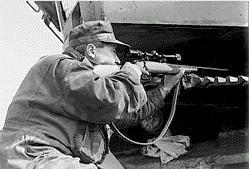Stress In War Zones
The Observer – 14-11-1993
Could the sickening atrocities being witnessed in Bosnia be a consequence of body chemistry and the effects of prolonged exposure to fear and stress?
By Christopher Long
 You're reading this on a quiet Sunday in a leafy suburb. Suddenly there's a devastating bang.
You're reading this on a quiet Sunday in a leafy suburb. Suddenly there's a devastating bang.
Instantly, a releasing factor, corticothrophin, acts on the pituitary gland in your brain, triggering the adrenal glands above your kidneys to flood your body with adrenaline, noradrenaline and cortisol. Your autonomic nervous system activates at peak performance. Blood diverts from your belly and skin, engorging your instantaneously turbo-charged brain, heart, lungs and limbs. A little later, naturally produced opiate painkillers, endorphins, add to the cocktail.
Your elbows clamp to protect your chest. Your head ducks, protectively. Your legs, in tension, kick the leg of the table. This topples a coffee pot falling at an accelerating speed of 32 feet per second/per second. You decide you're not in immediate danger because the bang was caused by a child's firework. Your left hand moves sideways to catch the coffee pot before it hits the floor.
The whole process has taken milliseconds, endowing the body with colossal strength and speed of reaction. Soon after you feel cold because of the diversion of blood from body surfaces and you might want a cigarette and a drink to calm your nerves – i.e. to return your system to 'normal'.
It's one of the most remarkable phenomena known to science, and because we don't have to use this complex electrical and chemical process very often, its potency as a survival system is normally devastatingly effective.
 But, in Bosnia, millions of civilians, gunmen, journalists, UN peacekeepers and aid workers experience these effects hour by hour and sometimes minute by minute over periods of many months. It's not unreasonable to suppose that there must be side-effects to abnormal exposure to such intensely potent chemistry.
But, in Bosnia, millions of civilians, gunmen, journalists, UN peacekeepers and aid workers experience these effects hour by hour and sometimes minute by minute over periods of many months. It's not unreasonable to suppose that there must be side-effects to abnormal exposure to such intensely potent chemistry.
"It's more than likely – it's very probable," agrees Christopher Mathias, Professor of Neurovascular Medicine at The University of London.
"It's something which we haven't studied enough. If possible, we should really be observing the before-and-after effects of this sort of stress."
The most perplexing and distressing characteristic of the Balkan conflicts has been the gratuitous cruelty accompanying the racial purging and persecution of civilians. Frequently this takes the form of frenzied sexual atrocities, mutilations and orgiastic killing. Nobody can excuse or rationalise these obscenities but they are usually committed while the perpetrators are experiencing the effects of severe long-term, high-adrenaline stress and while under the conflicting 'upper' and 'downer' influences of alcohol and marijuana.
 Many men in the war zones discover that sexual desire, and certainly sexual performance, deteriorate rapidly under sustained stress – in marked contrast to the experience of many women. Could it be that massive chemical imbalances in the body are inducing men to perform ever greater excesses in a bid to stimulate their dulled senses to some semblance to 'normality'?
Many men in the war zones discover that sexual desire, and certainly sexual performance, deteriorate rapidly under sustained stress – in marked contrast to the experience of many women. Could it be that massive chemical imbalances in the body are inducing men to perform ever greater excesses in a bid to stimulate their dulled senses to some semblance to 'normality'?
"Certainly this could be the case," says Professor Mathias. "We know that drugs and alcohol alone may stimulate desire but damage performance. But add them to the cocktail of chemistry created by intense stress and you've got a mess."
"We don't know what long-term high intensity stress might bring. One theory is that it would cause hypertension, leading to potential heart-attacks, strokes and kidney failure."
This prediction has certainly been borne out by medical observations in Sarajevo. Furthermore, if the whole system is on alert all the time, the receptor regulation controlling the heart and blood vessels can 'down-regulate', meaning that when the stimulus is withdrawn they under-perform. Equally, continuous stress can cause the autonomic nerves, which control the entire response system, to malfunction. This might lead to lethargy, a dulling of the senses and feeling faint.
This would only be enhanced by the endemic use of more alcohol and marijuana to 'calm the nerves' or 'feel better'. The consequent likelihood of irrational perception, thinking and decision-making by soldiers, civilians and peacekeepers and observers becomes obvious.
 And, just as alcoholics and drug-abusers need another fix just to feel 'normal' because their bodies over-compensate or under-compensate for chemical imbalances, so people exposed to long-term stress and danger in war-zones may find a need for ever greater excesses of physical or sexual aggression in order that their senses and responses feel anything like normal.
And, just as alcoholics and drug-abusers need another fix just to feel 'normal' because their bodies over-compensate or under-compensate for chemical imbalances, so people exposed to long-term stress and danger in war-zones may find a need for ever greater excesses of physical or sexual aggression in order that their senses and responses feel anything like normal.
Could all this explain, in part, the incidence of rape, sexual assault, physical torture and cruelty that seem endemic in Bosnia and Croatia?
"The genital organs might indeed need higher levels of mental, sensual stimulation to induce physical responses," Professor Mathias says. "This would particularly be the case if the brain's receptors have been damaged by extreme exposure to stress and danger. Young men would undoubtedly be deeply disturbed, either consciously or subconsciously, by these baffling effects and this might add to a sense of grievance."
The nature of the Balkan conflicts may assist the process. In this unusual civil war with no clearly-defined front lines, where danger exists everywhere, all the time, and victims in one valley are aggressors in the next, there's no refuge. Old friends and neighbours can be new enemies and aggressors at any moment. Irrational, arbitrary snipers operate anywhere, any time. No-one ever relaxes. But the body's 'fear and flight' mechanisms were never designed for this.
"The long-term effects? My prognosis is that the peripheral organs like the heart, lungs, liver and kidneys will adapt to peace sooner than the brain and any damage to its receptors," Professor Mathias maintains.
"Unfortunately we just don't know enough about this to predict the long-term price of the mental effects on people who've lived through all this. We really need to know more about it."
Christopher Long has been a front-line correspondent in former Yugoslavia since the conflicts began.
"Like some infernal monster. still venomous in death,
a war can go on killing people for a long time after it's all over."
Nevil Shute – Requiem For A Wren
The author was subsequently asked to re-enact the effects of stress-induced sleep disturbance and deprivation for 'Sleep', a Twenty Twenty TV series for Channel 4, screened in the UK in July 1998.
© (1993) Christopher Long. Copyright, Syndication & All Rights Reserved Worldwide.
The text and graphical content of this and linked documents are the copyright of their author and or creator and site designer, Christopher Long, unless otherwise stated. No publication, reproduction or exploitation of this material may be made in any form prior to clear written agreement of terms with the author or his agents.
















